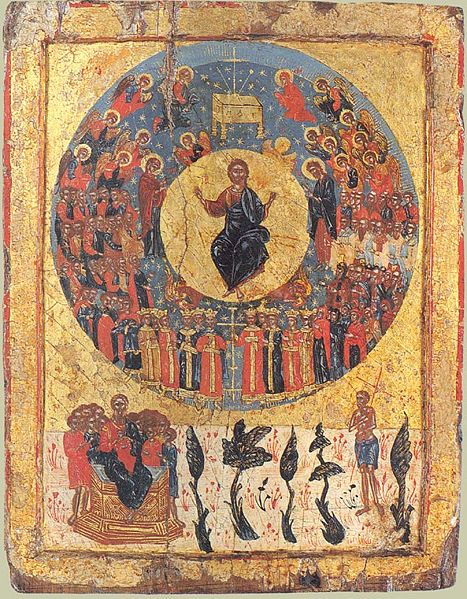Dear Brothers and Sisters in Christ,
The name for the Sunday of the Prodigal Son is taken from the parable of our Lord Jesus Christ found in Luke 15:11-32. The parable is the story of a man and his two sons. The youngest of the sons asks his father to give him his inheritance. The father does this, and soon after the son leaves and journeys to a distant country. He abandoned his father in order to make his life one wild party, and ended up in a pig sty so wild with hunger that he envied the food of the swine. He realized that he had sinned against his father, that he wasn’t worthy to be called his son anymore, and wanted only to be a hired hand. The father did not judge, condemn, or reject his son; instead, he rejoices that a beloved child who was lost has returned home, that one who was dead to him has been restored to life. The good news is that God did not create us for a joyless life of despair, but to share in the blessedness of His life.
On the Sunday of the Last Judgment focus is placed on the future judgment of all persons who will stand before the throne of God when Christ returns in His glory. In Matthew 25:31-46, Christ speaks about what will happen at this specific point in time when He will “come in His glory, and all the holy angels with Him”. This Sunday is called Meatfare Sunday since it is traditionally the last day before Easter for eating meat. Orthodox Christians observe a fast from meat all week, but still eat dairy products and eggs till the start of Great Lent. Salvation and final judgment will depend upon deeds, not merely on intentions or even on the mercies of God apart from personal cooperation and obedience. All piety and prayer is ultimately directed towards the goal of serving Christ through his people.
Forgiveness Sunday, also called Cheesefare Sunday, is the final day of pre-Lent. On this last Sunday before Great Lent, the last day that traditionally Orthodox Christians eat dairy products until Easter, the Church remembers the expulsion of Adam and Eve from Paradise. God commanded them to fast from the fruit of a tree (Gen. 2:16), but they did not obey. In this way Adam and Eve and their descendants became heirs of death and corruption. The Gospel reading of the day also gives advice on fasting (Matthew 6:16-18). On Forgiveness Sunday many attend Forgiveness Vespers on the eve of Great Lent. They hear on the Lord’s teaching about fasting and forgiveness and enter the season of the fast forgiving one another so that God will forgive them.
Originally the Lenten fast was the time for catechumens to prepare for baptism and entry into the Church. The Sunday spiritual themes were part of the early Christian catechesis. The Sunday of the Triumph of Orthodoxy is celebrated on the first Sunday of Great Lent. It is the celebration of the victory of the iconodules over the iconoclasts by the decision of the Seventh Ecumenical Council. Therefore, the service is to commemorate the restoration of icons for use in services and private devotional life of Christians. The Gospel lesson is John 1:43-51. The catechumens of the early church, and the faithful preparing for Pascha today, are told that, with faith, they will see the inauguration of the new age, the fulfillment of all promises, and the manifestation of the Kingdom, through the Incarnation, in the Church.
Prayerfully Yours,
Fr. Mile
Драга браћо и сестре у Христу,
Недеља о блудном сину је добила име по причи Господа Исуса Христа коју читамо у Јеванђељу по Луки 15, 11-32. Прича је о човеку и његова два сина. Млађи син је од оца затражио да му да део свог имања. Отац је то учинио, а син га је напустио и отишао у далеку земљу. Блудни син се удаљио од оца да би да живот проведе у забави, и на крају је завршио међу свињама, са којима је делио храну. Схватио је да се огрешио о свог оца, да није могао да се назове његовим сином, и пожелео је да му се врати као један од његових слуга. Отац није осуђивао, казнио, или одбацио свог сина. Напротив, он се обрадовао вољеном детету које се вратило кући, и које је било мртво и враћено у живот. Радосна је вест да нас Бог Отац није створио да будемо без радости и очајни, већ да делимо благослов живота са Њим.
У Недељу последњег суда смо усредсређени на суђење свима који ће да стану пред Божији престо, када се Христос врати у својој слави. У Јеванђељу по Матеју 25, 31-46 Христос говори шта ће да се догоди у моменту када ”дође у слави својој, и и сви свети анђели са Њим”. Ова недеља се још зове и Месопусна, пошто је то последњи дан када се једе месо све до Васкрса. Православци се читаве наредне недеље уздржавају од меса, али настављају да једу. млеко и јаја, све до почетка Великог поста. Наше спасење и последњи суд зависе од наших дела, а не само од наших намера или Божије милости, независно од личне сарадње и наше послушности. Сва наша побожност и молитве треба да су усмерени према коначном циљу, а то је служење Христу кроз служење људима.
Недеља праштања се још зове и Недеља сиропусна, и последњи је дан пред Велики пост. Тог дана православци последњи пут мрсе све до Васкрса, док се Црква сећа изгнања Адама и Еве из раја. Господ им је заповедио да се уздржавају од плодова са дрвета (Пост. 2,16), али га они нису послушали. Адам и Ева и њихови потоци су на тај начин постали наследници смрти и пропадљивости. Одломак из Јеванђеља тог дана нас учи како да постимо (Матеј 6, 16-18). У Недељу праштања многи долазе на вечерње праштања, које се служи у предвечерје Великог поста. Они слушају о речи Господа о посту и праштању, и почињу период уздржања праштајући једни другима, да би и Бог опростио њима.
Велики пост је с почетка био период у коме су се оглашени припремали за крштење и улазак у Цркву. Духовне теме недеља у току Великог поста су биле део ранохришћанске веронауке. Недеља Православља се славила прве недеље Часног поста. То је слављење победе поштоваоца икона над иконоборцима, у скалу са одлукама Седмог васељенског сабора. Према томе, служба слави обнову употребе икона на богослужењима и у молитвеном животу у домовима хришћана. Одломак из Јеванђеља које се чита је по Јовану 1, 43-51. Катихуменима (оглашенима) у раној Цркви, али вернима који се припремају за Васкрс у данашње време, говори се да ће са вером да виде успостављање Новог века у Цркви, кроз оваплоћење (утеловљење) Бога.
Молитвено Ваш,
свешт. Миле


